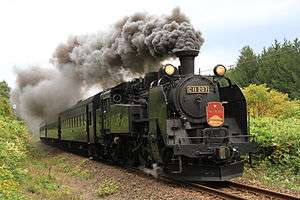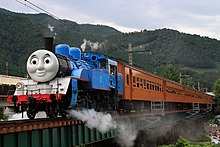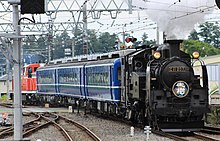JNR Class C11
The Class C11 (C11形) is a type of 2-6-4T steam locomotive built by the Japanese Government Railways and the Japanese National Railways from 1932 to 1947. A total of 381 Class C11 locomotives were built.[1]
| Class C11 | |||||||||||||||||||||||||
|---|---|---|---|---|---|---|---|---|---|---|---|---|---|---|---|---|---|---|---|---|---|---|---|---|---|
 JR Hokkaido C11 207 hauling a Niseko tourist service in September 2014 | |||||||||||||||||||||||||
| |||||||||||||||||||||||||
| |||||||||||||||||||||||||
Overview
The Class C11 was based on the earlier 2-6-4T Class C10 type built in 1930.[1]
Preserved examples
50 Class C11 locomotives are preserved, as listed below, with five in working order.[2]
Operational
- C11 171: Operated by JR Hokkaido and based at Asahikawa Depot[2]
- C11 190: Operated by Oigawa Railway in Shizuoka Prefecture[2]
- C11 207: Operated by Tobu Railway in Tochigi Prefecture. Operating as SL Taiju.
- C11 227: Operated by Oigawa Railway in Shizuoka Prefecture. Currently dressed up as Thomas the Tank Engine [2]
- C11 325: Operated by Mooka Railway in Tochigi Prefecture[2]
As of September 2016, C11 207 is on loan to the private railway operator Tobu Railway for use on the Tobu Kinugawa Line between Shimo-Imaichi and Kinugawa-Onsen stations from August 2017.[3]
 C11 171 in 2002
C11 171 in 2002 C11 190 in August 2012
C11 190 in August 2012 C11 207 in October 2007
C11 207 in October 2007 C11 227 repainted to look like Thomas the Tank Engine on the Oigawa Railway in August 2014
C11 227 repainted to look like Thomas the Tank Engine on the Oigawa Railway in August 2014 C11 325 in May 2014
C11 325 in May 2014 C11 207 in June 2020
C11 207 in June 2020
Static
- C11 1: Ome Railway Park in Ome, Tokyo[2]
- C11 40[2]
- C11 46[2]
- C11 61[2]
- C11 63[2]
- C11 64: Umekoji Steam Locomotive Museum in Kyoto[2]
- C11 66[2]
- C11 75[2]
- C11 80[2]
- C11 96[2]
- C11 131[2]
- C11 133[2]
- C11 155[2]
- C11 167[2]
- C11 180[2]
- C11 189[2]
- C11 191[2]
- C11 195[2]
- C11 200[2]
- C11 209[2]
- C11 210[2]
- C11 217[2]
- C11 218[2] static display outdoors in poor state at Haya Sohonten Yakiniku in Mikunigaoka, Sakai City as of June 2020 (see Google Maps streetview)
- C11 224[2]
- C11 227[2] The old one got repainted and the smoke deflectors were removed from the old C11 227 to look like Thomas the Tank Engine
- C11 244[2]
- C11 245[2]
- C11 254[2]
- C11 257[2]
- C11 259[2]
- C11 260[2]
- C11 265[2]
- C11 270[2]
- C11 275[2]
- C11 292: In front of Shimbashi Station in Minato, Tokyo[2]
- C11 296[2]
- C11 304[2]
- C11 311[2]
- C11 312: Oigawa Railway in Shizuoka Prefecture (used for spare parts)[2]
- C11 322[2]
- C11 324: Umekoji Steam Locomotive Museum in Kyoto (cab section only)[2]
- C11 331[2]
- C11 351: Sendai General Shinkansen Depot in Rifu, Miyagi[2]
- C11 367[2]
- C11 368[2]
- C11 372[2]
- C11 1 at Ome Railway Park in May 2006
- C11 191 in January 2015
- C11 224 in August 2009
 C11 257 in January 2009
C11 257 in January 2009 C11 292 in February 2008
C11 292 in February 2008 C11 312 while still in service, April 1997
C11 312 while still in service, April 1997 C11 351 in July 2009
C11 351 in July 2009
gollark: Oops, that got cut off.
gollark: Do you REALLY want to know?
gollark: Those messages are so annoying!
gollark: WHY?!
gollark: Simply press the button in my base to receive 16 MELON™.
References
| Wikimedia Commons has media related to C11 steam locomotives. |
- Inoue, Kōichi (1999). 国鉄機関車辞典 [JNR Locomotive Encyclopedia] (in Japanese). Japan: Sankaido. pp. 24–25. ISBN 4-381-10338-6.
- Sasada, Masahiro (September 2012). 国鉄&JR保存車大全 [JNR & JR Preserved Rolling Stock Complete Guide] (in Japanese). Tokyo, Japan: Ikaros Publications Ltd. p. 131. ISBN 978-4863206175.
- 東武鬼怒川線で復活するSL「大樹」の営業運転開始日を2017年8月10日(木)に決定! ["Taiju" steam locomotive on Tobu Kinugawa Line to enter service on Thursday 10 August 2017] (PDF). News release (in Japanese). Japan: Tobu Railway. 18 January 2017. Archived from the original (pdf) on 19 January 2017. Retrieved 19 January 2017.
This article is issued from Wikipedia. The text is licensed under Creative Commons - Attribution - Sharealike. Additional terms may apply for the media files.